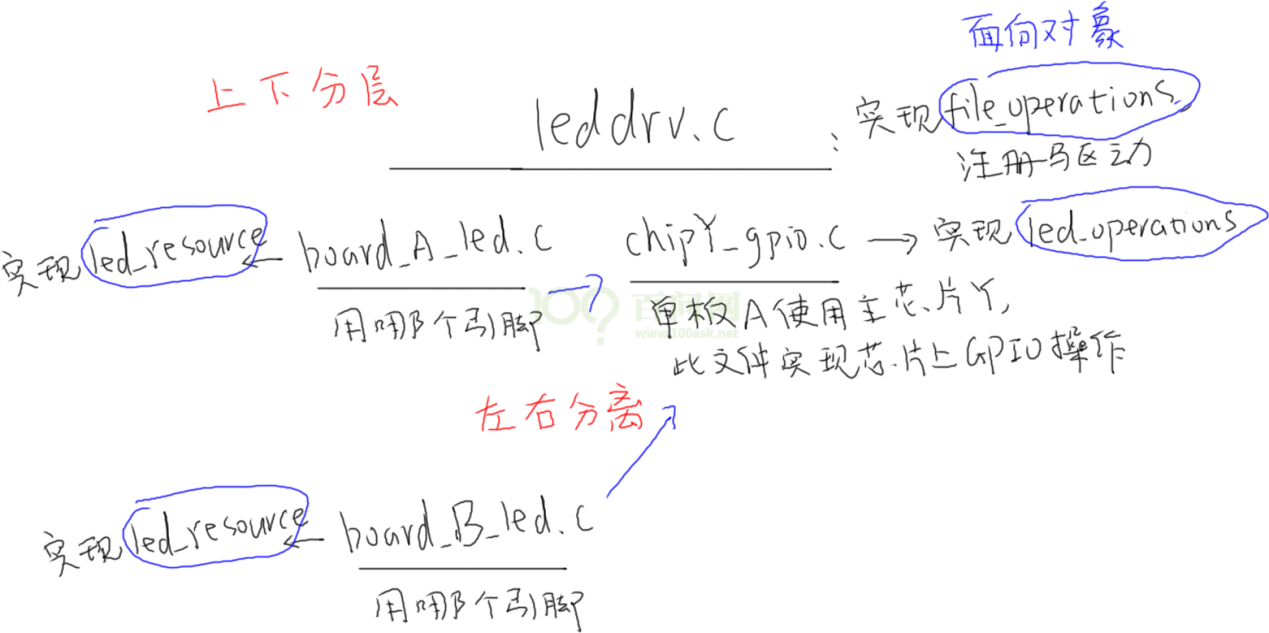驱动程序分离的思想
想想前面的LED驱动程序还有什么缺点?
我们已经解决了驱动程序与硬件绑定太死的问题,提升了驱动程序的通用性。
但是想想硬件操作是不是可以改进?
同一块开发板LED有不同的引脚,如果换一个引脚,broad.c中硬件操作的函数全部要修改。如果有100个引脚,
要写100份braod.c?
事实上,每一款芯片它的GPIO操作都是类似的
GPIO1_3:
有方向寄存器DIR、数据寄存器DR等,基础地址是addr_base_addr_gpio1。
设置为output引脚:修改GPIO1的DIR寄存器的bit3。
设置输出电平:修改GPIO1的DR寄存器的bit3。
GPIO5_4
有方向寄存器DIR、数据寄存器DR等,基础地址是addr_base_addr_gpio5。
设置为output引脚:修改GPIO5的DIR寄存器的bit4。
设置输出电平:修改GPIO5的DR寄存器的bit4。
既然引脚操作那么有规律,并且这是跟主芯片相关的,那可以针对该芯片写出比较通用的硬件操作代码。
比如board_A.c使用芯片chipY,那就可以写出:chipY_gpio.c,它实现芯片Y的GPIO操作,适用于芯片Y的所有GPIO引脚
使用时,我们只需要在board_A_led.c中指定使用哪一个引脚即可。
程序结构

LED驱动程序改进
led_drv.c led_drv_test.c 不变
broad.c 进一步细分
board_A_led.c ====》指定硬件资源如,LED引脚
chipY_gpio.c =====》芯片Y的GPIO通用操作,它首先获取硬件资源,然后根据资源,执行相应操作
led_resource.h
#ifndef _LED_RESOURCE_H
#define _LED_RESOURCE_H
/* GPIO3_0 */
/* bit[31:16] = group */
/* bit[15:0] = which pin */
#define GROUP(x) (x>>16)
#define PIN(x) (x&0xFFFF)
#define GROUP_PIN(g,p) ((g<<16) | (p))
struct led_resource {
int pin;
};
struct led_resource *get_led_resouce(void);
#endif
broad_A_led.c
#include "led_resource.h"
static struct led_resource board_A_led = {
.pin = GROUP_PIN(3,1),
};
struct led_resource *get_led_resouce(void)
{
return &board_A_led;
}
chipY_gpio.c
#include <linux/module.h>
#include <linux/fs.h>
#include <linux/errno.h>
#include <linux/miscdevice.h>
#include <linux/kernel.h>
#include <linux/major.h>
#include <linux/mutex.h>
#include <linux/proc_fs.h>
#include <linux/seq_file.h>
#include <linux/stat.h>
#include <linux/init.h>
#include <linux/device.h>
#include <linux/tty.h>
#include <linux/kmod.h>
#include <linux/gfp.h>
#include "led_opr.h"
#include "led_resource.h"
static struct led_resource *led_rsc;
static int board_demo_led_init (int which) /* 初始化LED, which-哪个LED */
{
//printk("%s %s line %d, led %d\n", __FILE__, __FUNCTION__, __LINE__, which);
if (!led_rsc)
{
led_rsc = get_led_resouce(); //获取硬件资源
}
printk("init gpio: group %d, pin %d\n", GROUP(led_rsc->pin), PIN(led_rsc->pin));
switch(GROUP(led_rsc->pin))
{
case 0:
{
printk("init pin of group 0 ...\n");
break;
}
case 1:
{
printk("init pin of group 1 ...\n");
break;
}
case 2:
{
printk("init pin of group 2 ...\n");
break;
}
case 3:
{
printk("init pin of group 3 ...\n");
break;
}
}
return 0;
}
static int board_demo_led_ctl (int which, char status) /* 控制LED, which-哪个LED, status:1-亮,0-灭 */
{
//printk("%s %s line %d, led %d, %s\n", __FILE__, __FUNCTION__, __LINE__, which, status ? "on" : "off");
printk("set led %s: group %d, pin %d\n", status ? "on" : "off", GROUP(led_rsc->pin), PIN(led_rsc->pin));
switch(GROUP(led_rsc->pin))
{
case 0:
{
printk("set pin of group 0 ...\n");
break;
}
case 1:
{
printk("set pin of group 1 ...\n");
break;
}
case 2:
{
printk("set pin of group 2 ...\n");
break;
}
case 3:
{
printk("set pin of group 3 ...\n");
break;
}
}
return 0;
}
static struct led_operations board_demo_led_opr = {
.init = board_demo_led_init,
.ctl = board_demo_led_ctl,
};
struct led_operations *get_board_led_opr(void)
{
return &board_demo_led_opr;
}

